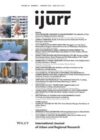Waste-to-biofuel (WTB) programs have gained popularity as a municipal circular economy and an emissions reduction strategy. The upgrading of biofuels to renewable natural gas (RNG) has drawn particular interest, as RNG can displace conventional fossil fuels in any existing natural gas end use and be delivered through existing pipeline infrastructure. This article examines RNG produced at the City of Toronto’s waste facilities in partnership with Enbridge Distribution Inc. Toronto has framed its program as a strategy to ‘close the carbon loop’, recirculating waste as a new energy resource and, by extension, the carbon embodied in municipal waste. The article, first, examines the construction of the carbon loop policy narrative that draws from the technical work of emissions accounting. Second, it discusses how and why choices that shape energy systems are made as part of such programs. In Toronto, distributing through the Enbridge pipeline network has enabled the production of flexible environmental attributes that can be virtually assigned to a range of end uses and users. Understanding how policy narratives are constructed to describe municipal policy experimentation and situate municipal experiments within wider energy systems and energy system politics is critical to ensure experiments contribute to long-term net zero pathways.
Details
Written by:
Taylor Davey
Digital Object Identifier (DOI)
https://doi.org/10.1111/1468-2427.70032
About DOI
